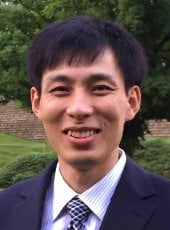 Lei Pan (ChemEng/GLRC) is the principal investigator on a project that has received a $159,999 research and development grant from the National Science Foundation.
Lei Pan (ChemEng/GLRC) is the principal investigator on a project that has received a $159,999 research and development grant from the National Science Foundation.
The project is entitled, “Collaborative Research: Bubble Impacting a Curved Surface: A Sustainable Way to Sanitize Produce.”
This is a potential three-year project.
By Sponsored Programs.
Extract
Cleaning practices using microbubbles have been proven to be a sustainable and environmentally benign sanitation method in a wide range of industrial applications. When a stream of bubbles impact and slide on a surface, contaminants on the surface can be removed due to the strong force generated by the bubbles.
Bubble-cleaning of agricultural produce like fruits and vegetables has not been studied extensively. Potentially, this method could be used to minimize cases of food poisoning affecting millions of people every year, since bubble streams could be used to remove and inactivate pathogenic microorganisms from produce surfaces.
This research project could lead to a novel technology for an environmentally benign sanitization process for raw fruits and vegetables. The method could even be applied to other technological processes such as semiconductor manufacturing.

